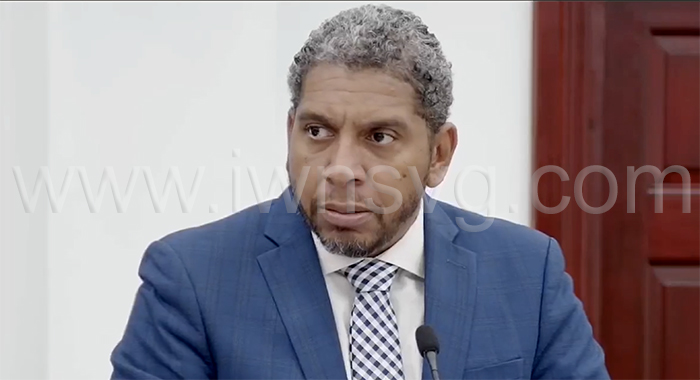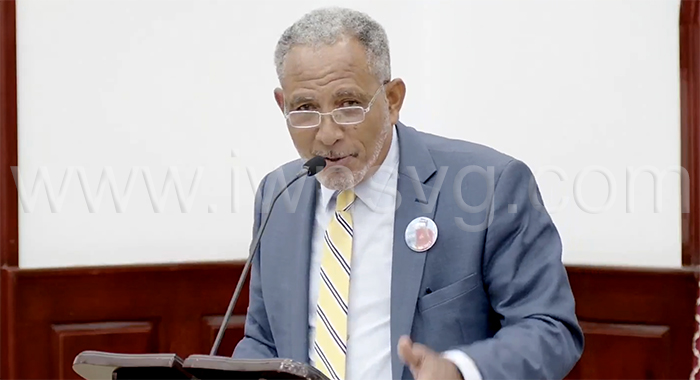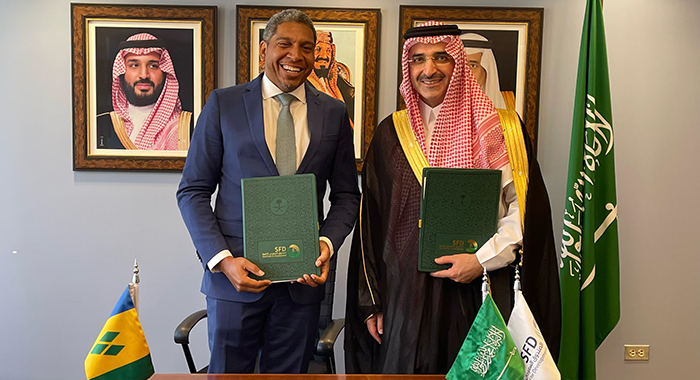The government has borrowed EC$135 million from the Saudi Fund for Development (SFD) to spend on education, national security, health, youth and sports and housing.
The opposition welcomed the allocation of the monies but said it has to be monitored carefully to ensure that it is used as intended.
The loan agreement, which Minister of Finance Camillo Gonsalves signed with Saudi officials in Washington last month, was brought to Parliament for approval on Thursday as the Natural Disaster (Construction and Rehabilitation Project) Loan Authorisation Bill.
The loan is at 2% interest to be repaid over 20 years with a five-year grace period and was included in the EC$1.6 billion budget for 2024 that Parliament approved in January.
“That means that the first payment on the loan will be made in 2029 and the final payment on the loan will be made in 2043,” Gonsalves told lawmakers
It will fund projects expected to be completed by the end of 2026.
“However, the closing date of the loan is the end of 2027,” Gonsalves said, adding that this gives “a little bit of leeway, a little bit of flex time on the back end in case things don’t proceed as quickly as you would expect them to proceed and so on”.

Gonsalves told Parliament that the money is divided into components A, B, C, D, and E.
Component A, to which EC$27 million is allocated, is for the rehabilitation and construction of primary and secondary schools.
This includes building a secondary school in Brighton, located in East St. George, for which the finance minister is MP.
“… the classrooms in this climate-resilient facility will be equipped with modern systems and other facilities such as library and laboratories and the like. So, it’ll be a totally modern secondary school,” Gonsalves said.
The other major project in Component A is a centre for technical and vocational education and training in Union Island, in the Southern Grenadines, an opposition stronghold.
Component B is the rehabilitation of national security facilities, at a cost of EC$17.6 million.
“That basically means police stations,” Gonsalves said, adding that a new police station will be built in Stubbs, along with the repair of 20 police stations, the Coast Guard Service headquarters, the police garage and the outbuildings at Arnos Vale and the Old Montrose Police Training School.
Components C is the construction and rehabilitation of healthcare facilities. With this EC$21.6 million allocation, the government will build a clinic at Lodge Village, as well as upgrade the healthcare facilities at Byera, Calliaqua and Paget Farm.
Under component D, the government will spend EC$27 million on the improvement of sports facilities, primarily the Sir Vincent Beache Athletic Stadium, where floodlights will be installed.
Additionally, the government will buy track and field equipment, design and build a spectators’ pavilion with seating, an entrance building, a retention tank for the irrigation system, develop a mound, install a warm-up track, construct a roadway and drainage, including gates, as well as minor works on the existing track.
“So, this is a massive investment in further upgrading the Sir Vincent Beache Stadium at Diamond,” Gonsalves said, noting that the government had said it would build the stadium in phases.
Component E, at EC$35.1, is the largest portion of the EC$135 million loan and will go to the rehabilitation and rebuilding of homes damaged by the April 2001 eruption of La Soufriere volcano.
“There is also a contingency, as there always is in these types of contracts, of EC$6.8 million and that gives you your $135 million,” Gonsalves said.

Opposition calls for parliamentary vigilance
Meanwhile, Opposition Leader Godwin Friday pointed to projects in his constituency, the Northern Grenadines that could be addressed under the loan programme.
He said that the Lives to Live Programme, under which the government builds, modifies or repairs homes for poor people, “seems to me it fits that bill.
“But how the allocations are made and who gets onto the priority list, these are things that have to be more transparent because there’s a lot of people who feel that they are simply not being given the attention even though their needs are very urgent,” Friday told Parliament.
He said that while the opposition is always concerned about the effects of further borrowing for the government, “We understand this is a developing country.
“And in this situation, if these loans are going to be deployed in a way that helps the people in various communities with their urgent needs so that they can repair their homes and so forth and also deal with public projects or public institutions, public buildings, in various communities that have been long overdue for that sort of attention…”
Friday said it is a matter for the Parliament “to also be very vigilant to ensure that the aims that are being put forward here for this loan, for the monies that are being spent, that is being borrowed on behalf of the country, … that they’re held accountable as to how it’s actually executed.
“Because it’s one thing when you come and you say these are the things that we’re going to do and so forth, and then on the ground, to see when they’re actually done and the priority that is given to which particular areas.
“That is something that we are going to do in this Parliament. And we are going to ensure that, especially as we go forward now, that the government is held accountable in its spending of this money, and that those persons who are in greatest need … get the attention that is deserved.”
Meanwhile, Gonsalves told Parliament that the terms of the loans are different from other agreements in that Kingstown must employ Caribbean or Saudi consultants acceptable to the SFD to assist in project tendering and supervision.
Similarly, SVG must employ Saudi and Caribbean regional suppliers and contractors acceptable to the fund upon the terms and conditions satisfactory to the fund.
“And clearly, that includes contractors and suppliers in St. Vincent and the Grenadines,” Gonsalves told lawmakers.
“So, this is an important developmental feature of Saudi Fund loan agreements: that they want you to use local talent, local skills, local contractors, local suppliers…
“Usually, it’s local to your country. But because St. Vincent and the Grenadines is a small country and we spoke to them about some of the limitations that we would have, they widened it to the Caribbean,” Gonsalves said.
“But if you cannot find the consultant, the contractor or the supplier in the Caribbean region, including St. Vincent and the Grenadines, then your fallback position is that you procure those items, skills, talents, services from Saudi Arabia. So, there is that constrains the procurement in that way,” the finance minister told Parliament.







I do hope that the Barrouallie police station is on the agender.The old building is in an ideal location, and should be repaired or renovated at any cost.
Million were recieved for houding in the aftermath of the volcanic eruption. What happened to that money? Utmost neglect amd share wickednedd why manybif rhwnstations are the way they are. Over the years no maintemace of any kind and the station detiorated beyond repairs.
In Spring Village NL, the government is paying rent over 15 years now and all the station needed initially was roof repairs. Ralph only cases about “his police” the others are left to wallow in delapidated conditions.
Thus big loan of 130 million plus is election money hoping that it will be used to bribe and buy votes.for rhe 6th term.
I hope the.vincentian people are.not duped again. Too long with Ralph and his family running the ahow.
Ar yo na weary borrow , beg , bribe ? and in my opinion teeeef an lie.